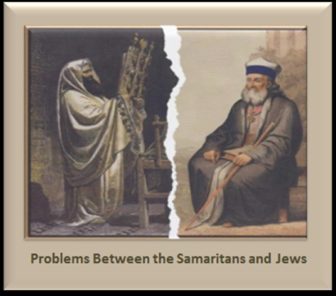Problems Between the Samaritans and Jews

There has been example of problems between the Samaritans and the Jews. A look at history according to the Bible may shine a light on what the problems were and give us a better understanding of their relationship. This will shine a light on the deep meaning of the meaning of the Samaritan Woman at the well and the Parable of the Good Samaritan.
History of Samaria begins in the Old Testament with the kingdom of Solomon which was divided after his death. The house of David continued to rule Jerusalem and the kingdom of Judah. The kingdom of Israel came into being in the north. Samaria was a watch mountain, watch tower in the heart of Israel. The northern kingdom, called Israel, established its capital first at Shechem, and later at the hilltop city of Samaria. Samaria was made the new capital of the kingdom of Israel under the reign of king Omri.
1 Kings 16:22-29 tells us that the people of Israel divided into two parts. Half of the people followed Tibni the son of Ginath who was made king. The other half followed Omri who prevailed against the people that followed Tibni. Once Tibni died Omri reigned. The king of Judah was Asa who had reigned 31 years when Omri began to reign over Israel. Omri reigned for 26. Omri did evil in the eyes of the LORD, and did worse than those who had gone before him. When Omri died and was buried in Samaria his son Ahab reigned as king of Israel. Ahab reigned over Israel 22 years.
1 Kings 19 -2 Kings 9 gives the Biblical account of the reign of king Ahab and his wife Jezebel. They had built an altar to the god baal in Samaria. This was against the LORD God and there were many misfortunes that happened to the kings and their families. Samaria was frequently besieged and had great famines. Many kings of Israel were buried in Samaria. Hosea 13:16 tells us that Samaria shall become desolate; because she rebelled against her God: they shall fall by the sword: their infants shall be dashed in pieces, and their women with child shall be ripped up. The city of Samaria was destroyed by Assyria in 721 BC then was rebuilt by Herod.
The Samaritans were of mixed races, but claimed to be descended from the Jews who remained in Samaria after the Assyrian had destroyed it. While the Samaritan was in captivity by the Assyrians they began to worship the invaders pagan idols as well as the LORD God. (2 Kings 17:24). Ezra 9:1-10:44; Nehemiah 13:23-28 tells us that there were intermarriages between Canaanites, the Hittites, the Perizzites, the Jebusites, the Ammonites, the Moabites, the Egyptians, and the Amorites.
The Southern kingdom of Judah fell to Babylon and its people were carried off into captivity. The remnants, about 70 years later, were permitted to return and rebuild Jerusalem. The Samaritans opposed the return and tried to undermine the attempt to reestablish the nation of Judah. The Southern kingdom of Judah despised the mixed marriages and the worship of false god by the northern kingdom of Israel of Samaria. They were divided by ethnic, cultural and racial barriers. Jews had no dealings with the Samaritans and the Samaritans had no dealings with the Jew. The Samaritan Jews as a religious group worshiped at a temple they had built at Mount Gerizim near Shechem. The New Testament gives us a clue to why there was so much friction between the Samaritans and the Jews of Jerusalem. The Jews of Jerusalem did not recognize the Samaritans as being Jews and regarded them with contempt.
The Bible story “The Good Samaritan” found in Luke 10:25-37 describes how Jesus was asked by a lawyer what he should do to gain eternal life. Jesus said he must love the LORD God with all his heart, soul and mind, and love his neighbor as himself. Then Jesus told the parable of the Good Samaritan how a man had been robbed, beat, stripped and left for dead while traveling from Jerusalem to Jericho. A priest, then a Levite came along but passed this injured half dead man without helping him. It was a Samaritan man who came along and when he saw the injured man he had compassion on him. This Samaritan man tended his wounds, put him on his own donkey, and took him to an inn to get him help. He also paid the innkeeper to take care of all the needs of the wounded man and paid him to do so. The hero of this parable was a Samaritan who was despised by the Jewish community.
The Samaritan Woman by the well found in John 4:4-42 gives a better insight to the problem between the Jews and Samarians. This woman was an outcast of her village because she was living with a man who was not her husband and had five husbands. This Samaritan woman was amazed that this man Jesus had ask her a Samaria woman for a drink from the well. Jews have no dealings with Samaritans. She reminded Jesus that there was a debate between the Jews and Samaritans as to where the LORD God should be worshiped; at Jerusalem or Mount Gerizim. Jesus told her that this was not important for the Spirit of the LORD must be worshiped in spirit and in truth. The woman recognized Jesus as the Messiah and because of this many of the Samaritans of that city believed on Jesus and saw Him as the Savior of the world.
The New Testament also mention in Acts 8:5-15 where it is recorded that Philip went down to the city of Samaria and preached Christ to them. The people gave heed unto those things which Philip spoke, hearing and seeing the miracles which he did. For unclean spirits, crying with loud voice came out of many that were possessed with them: and many taken with palsies, and that were lame, were healed. There was great joy in that city. But there was a certain man, called Simon, which before time in the same city used sorcery, and bewitched the people of Samaria, calling himself some great one. The people of Samaria gave him heed believing this man had the power of God. But when they believed Philip preaching the things concerning the kingdom of God, and the name of Jesus Christ, they were baptized, both men and women. Then Simon himself believed also: and when he was baptized, he continued with Philip, and wondered, beholding the miracles and signs which were done. When the apostles who were in Jerusalem heard that Samaria had received the Word of the LORD God; they sent Peter and John to Samaria. When they came down they prayed for them that they might receive the Holy Spirit.
Jesus broke all the stereotypes between the Jews and Samaritans. He told the woman at the well that it did not matter where one worshipped. “When the true worshippers shall worship the Father in spirit and in truth: for the Father seeketh such to worship him. God is a Spirit: and they that worship him must worship him in spirit and in truth.” (John 4:23-24)
Cite Article Source
MLA Style Citation:
Holstein, Joanne ” Problems Between the Samaritans and Jews:.” Becker Bible Studies Library Jan 2015.< https://guidedbiblestudies.com/?p=2147,>.
APA Style Citation:
Holstein, Joanne (2015, January) ” Problems Between the Samaritans and Jews:.” Becker Bible Studies Library. Retrieved from https://guidedbiblestudies.com/?p=2147,.
Chicago Style Citation:
Holstein, Joanne (2015) ” Problems Between the Samaritans and Jews:.” Becker Bible Studies Library (January), https://guidedbiblestudies.com/?p=2147, (accessed).

